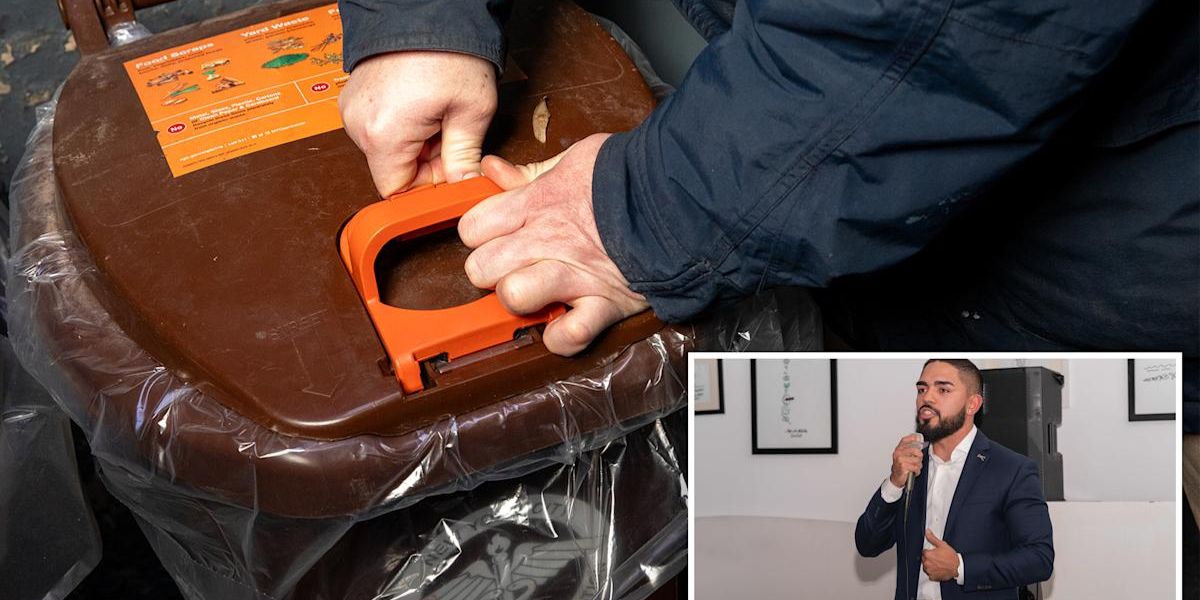Big Apple residents are legally required to compost their garbage, but steaming landlords say they’re getting the rotten end of the deal by being forced into dumpster diving to comply.
Starting Tuesday, the city will dish out $25 fines for failing to separate food scraps from regular trash .
But for apartment buildings, the responsibility will fall on maintenance staffers rather than the residents, who can continue to chuck their coffee grinds and chicken bones down the garbage chute without consequence, property owners claim.
“We don’t think that forcing hard-working building supers to be elbow-deep sorting through tenants’ garbage — turning building maintenance into a daily dumpster dive — is where the government should be focusing their energy and resources right now,” railed Kenny Burgos, the New York Apartment Association CEO and former Bronx state rep, to The Post.
“The city has tossed us a mess without gloves.”
Burgos has been protesting the composting mandate since before it went into effect in October as part of the Sanitation Department’s ongoing war on rats, warning that the “level of anonymity” in apartment buildings means the onus for sorting compost will fall on building management.
For apartment buildings with four or more units, the mandate means adding another general bin specifically for composting, similar to how garbage and other recycling is sorter.
All leaf and yard waste and food scraps, including food-soiled products such as paper plates and pizza boxes, are expected to be placed in composting bins.
“Every building in NYC handles trash differently, but for decades they have ALL been required to sort their recyclables — and now they are required to sort their compostable material as well,” said Vincent Gragnani, a spokesman for Sanitation, in an email.
“Whether that means bins on every floor or bins in one common area such as a basement would be up to the building management. The bottom line is that food and yard waste must be separated from trash and put out on recycling day so that we can turn it into finished compost or clean energy.”
But New Yorkers haven’t traditionally been good at recycling anything. Fewer than half of paper and cardboard that could be recycled in the city actually is, and just around 41% of plastic, glass, metal and cartons is tossed in the right bins, according to a study released by Sanitation last year.
Landlords now fear that the fallout from residents not properly composting will only fall on them.
“I challenge the people who passed this law and are trying to implement it on the backs of the housing people in the city of New York to spend two weeks sorting through garbage to see how well it works, especially in a multifamily building with a huge garbage chute,” griped John Crotty, who manages multiple buildings across the city.
Crotty slammed the law as “ill-conceived,” claiming that tenants who are not interested in composting won’t change their behavior because they won’t be handed down the fine.
The landlord expects his supers will now spend double the amount of time handling trash duties, which previously just amounted to bringing the garbage to the curb.
“If you’ve ever had to change diapers — that is disgusting. Now you have a garbage bag full of everyone else’s diapers and everything else they have. Are you going to [send workers in there]? It’s not kind to the people who work in the building,” Crotty said.
“They don’t care bout the employees who work in these buildings at all,” he said of city officials. “It is an impossible standard — it is detached from reality.”
Starting Tuesday, residents will be able to call 311 to report buildings that are not helping them compost their trash.







